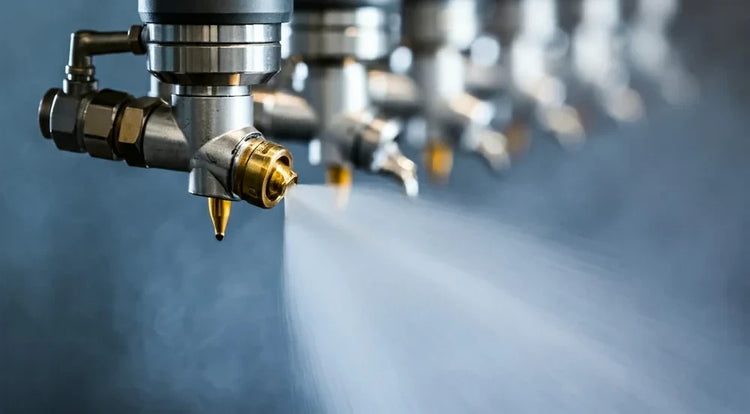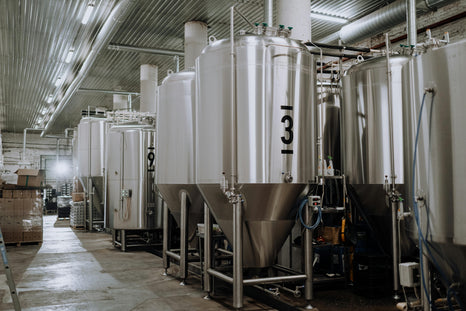In the world of chemical processing, the materials and tools we use can make a big difference. One such tool is the alkali-resistant nozzle. These nozzles are specially designed to handle harsh chemicals and tough conditions. They help keep processes running smoothly and efficiently. In this article, we'll explore why these nozzles are so important, how they are made, and where they are used. We'll also look at some real-life success stories and give tips on choosing and maintaining these nozzles.
Key Takeaways
- Alkali-resistant nozzles are essential for handling harsh chemicals in various industries.
- These nozzles improve process efficiency and durability under tough conditions.
- Understanding the material science behind these nozzles helps in choosing the right one for your needs.
- They are widely used in petrochemical, pharmaceutical, and food processing industries.
- Proper maintenance and troubleshooting can extend the lifespan of alkali-resistant nozzles.
The Role of Alkali-Resistant Nozzles in Chemical Processing
Alkali-resistant nozzles play a crucial role in chemical processing by ensuring that the equipment can withstand harsh conditions. These nozzles are designed to handle high pH levels and corrosive substances, making them essential for maintaining the integrity of the system.
Material Compatibility
One of the primary benefits of alkali-resistant nozzles is their compatibility with various chemicals. This compatibility ensures that the nozzles do not degrade or react negatively with the substances they come into contact with, which is vital for the longevity and efficiency of the equipment.
Durability Under Harsh Conditions
Alkali-resistant nozzles are built to last in extreme environments. They can withstand high temperatures and pressures, which are common in chemical processing. This durability reduces the need for frequent replacements and maintenance, saving both time and money.
Impact on Process Efficiency
Using alkali-resistant nozzles can significantly improve process efficiency. These nozzles provide consistent and reliable performance, which is crucial for maintaining optimal production levels. By reducing downtime and maintenance needs, they contribute to overall operational efficiency.
Material Science Behind Alkali-Resistant Nozzles
Alkali-resistant nozzles are crafted from materials that can withstand harsh chemical environments. These materials often include specialized alloys and high-performance plastics. The choice of material is crucial to ensure the nozzle's longevity and effectiveness in chemical processing applications.
The production of alkali-resistant nozzles involves advanced manufacturing techniques. Precision casting, injection molding, and CNC machining are commonly used to achieve the desired specifications. These methods ensure that the nozzles meet stringent quality standards and perform reliably under extreme conditions.
Performance metrics for alkali-resistant nozzles include resistance to chemical corrosion, durability, and flow rate consistency. These metrics are essential for evaluating the nozzle's suitability for specific applications. Regular testing and quality control measures are implemented to maintain high performance levels.
Understanding the material science behind alkali-resistant nozzles is key to selecting the right nozzle for your chemical processing needs. This knowledge helps in making informed decisions that enhance process efficiency and equipment longevity.
Applications of Alkali-Resistant Nozzles in Industry
Petrochemical Industry
Alkali-resistant nozzles are crucial in the petrochemical industry. They handle the harsh chemicals used in refining and processing. Their durability ensures long-term performance, reducing downtime and maintenance costs.
Pharmaceutical Manufacturing
In pharmaceutical manufacturing, these nozzles are used to spray coatings and clean equipment. Their resistance to alkali ensures that no contamination occurs, maintaining the purity of pharmaceutical products.
Food and Beverage Processing
In the food and beverage industry, alkali-resistant nozzles are used for cleaning and sanitizing equipment. They withstand the strong cleaning agents used, ensuring that the equipment remains hygienic and safe for food production.
The use of alkali-resistant nozzles across various industries highlights their importance in maintaining efficiency and safety in chemical processes.
Challenges in Implementing Alkali-Resistant Nozzles
Implementing alkali-resistant nozzles can be expensive. The initial investment in high-quality materials and advanced manufacturing techniques often results in higher upfront costs. However, these costs can be offset by the long-term benefits of reduced maintenance and increased efficiency.
Regular maintenance is crucial for the optimal performance of alkali-resistant nozzles. This includes routine inspections, cleaning, and timely replacement of worn-out parts. Neglecting maintenance can lead to reduced efficiency and potential system failures.
Integrating alkali-resistant nozzles into existing systems can be challenging. Compatibility with current equipment, potential modifications, and the need for specialized fittings are common issues. Proper planning and consultation with experts can help mitigate these challenges.
Ensuring seamless integration and regular maintenance can significantly enhance the performance and lifespan of alkali-resistant nozzles.
Innovations and Future Trends in Alkali-Resistant Nozzles
Advanced Materials
The development of advanced materials is revolutionizing the design and functionality of alkali-resistant nozzles. New composite materials are being engineered to offer superior resistance to chemical corrosion and physical wear. These materials not only extend the lifespan of the nozzles but also enhance their performance in demanding environments.
Sustainability and Environmental Impact
Sustainability is becoming a key focus in the development of alkali-resistant nozzles. Manufacturers are exploring eco-friendly materials and production methods to minimize environmental impact. Additionally, the improved durability of these nozzles means less frequent replacements, reducing waste and resource consumption.
The future of alkali-resistant nozzles looks promising with continuous innovations aimed at enhancing performance, reliability, and sustainability.
Best Practices for Selecting Alkali-Resistant Nozzles
Assessing Chemical Compatibility
When choosing alkali-resistant nozzles, it's crucial to evaluate the chemical compatibility of the nozzle material with the substances it will encounter. NozzlePro recommends conducting thorough compatibility tests to ensure the nozzle material can withstand prolonged exposure to harsh chemicals without degrading.
Evaluating Operational Conditions
Consider the operational conditions under which the nozzles will function. This includes factors such as temperature, pressure, and flow rate. Selecting nozzles that can endure these conditions will enhance their longevity and performance. NozzlePro advises consulting with experts to match nozzle specifications with your operational needs.
Supplier Selection Criteria
Choosing the right supplier is essential for obtaining high-quality alkali-resistant nozzles. Look for suppliers with a proven track record, comprehensive product warranties, and excellent customer support. NozzlePro suggests evaluating suppliers based on their industry experience, product range, and after-sales service.
Proper selection of alkali-resistant nozzles can significantly impact the efficiency and safety of your chemical processing operations. Always prioritize quality and compatibility to achieve the best results.
Maintenance and Troubleshooting of Alkali-Resistant Nozzles
Routine Inspection Protocols
Regular inspections are crucial for ensuring the longevity and performance of alkali-resistant nozzles. Frequent checks can help identify wear and tear early, preventing costly downtime. Inspections should include visual checks for corrosion, blockages, and any signs of physical damage. Additionally, monitoring the spray pattern can reveal issues with nozzle performance.
Common Issues and Solutions
Several common problems can affect alkali-resistant nozzles, including clogging, corrosion, and uneven spray patterns. To address clogging, regularly clean the nozzles using appropriate solvents. For corrosion, ensure that the nozzles are made from materials compatible with the chemicals in use. Uneven spray patterns can often be corrected by adjusting the nozzle alignment or replacing worn parts.
Extending Nozzle Lifespan
To maximize the lifespan of alkali-resistant nozzles, follow these best practices:
- Use nozzles made from high-quality, durable materials.
- Implement a regular cleaning schedule to prevent buildup and blockages.
- Store nozzles properly when not in use to avoid physical damage.
- Regularly replace worn or damaged parts to maintain optimal performance.
Consistent maintenance and timely troubleshooting can significantly extend the life of alkali-resistant nozzles, ensuring efficient and reliable operation in chemical processing applications.
Keeping your alkali-resistant nozzles in top shape is key to their performance. Regular maintenance can prevent clogs and wear, ensuring they last longer. If you run into any issues, our troubleshooting guide can help you fix common problems quickly. For more tips and expert advice, visit our website today!
Conclusion
In conclusion, alkali-resistant nozzles play a crucial role in the chemical processing industry. They ensure the durability and efficiency of various processes by withstanding harsh alkaline environments. Proper selection and maintenance of these nozzles can lead to significant improvements in process quality and cost-effectiveness. As industries continue to advance, the importance of using the right materials and equipment, such as alkali-resistant nozzles, becomes even more evident. By understanding and implementing these tools correctly, we can achieve better performance and longevity in chemical processing applications.












